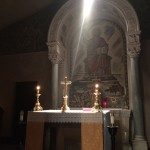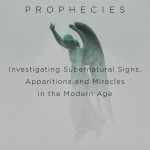Excerpt from God and the World; A Conversation between Peter Seewald and Joseph Cardinal Ratzinger.
Seewald: Is faith, in principle, always present in man?
Ratzinger: So far as we can learn about the history of mankind, through excavations right back into prehistory, we can see that there has always been an idea of God. The Marxists had professed the end of religion. With the end of oppression we would no longer need the medicine of God, we were told. But even they have had to recognize that religion never comes to an end, because it is present in man as such.
This inner sensor does not, in any case, work automatically, like some piece of technology, but is a living thing that can either develop with the person or, on the other hand, become desensitized and almost dead. With a progressive inner fulfillment the sensor becomes ever more acute, more alive and interactive. In the opposite case, it becomes dull and, as it were, anaesthetized. Nonetheless, even in an unbelieving person there remains somehow a vestigial question of whether there is after all something there. Without taking this inner sensitivity into account we just cannot understand the history of mankind.
There was an article in the news the other day, and I thought I’d saved it, but apparently not, about how researchers are confirming the idea that our tissue, our cellular makeup, holds memories. When I read it I thought of this Ratzinger quote on the “idea of God” throughout the life of man, and wondered – as I have many times before – whether our deep inclination to consider God, and our longing for Him, is not rooted in that moment of creation when God “breathed into Adam,” the merest bit of himself, his essence. Does our instinct for God reside there, in that tiny divine spark that departed from Himself into us – burned, as it were, into our DNA; is it that spark that moves within us and keeps us questing and longing, the spark that intuitively finds comfort in the notion of Christ wishing to “reconcile all things to Himself?”
This is how I used to explain it to my kids:
“When we are Created, the Creator puts a bit of himself in us – the Divine Spark – think of one of those cartoons where the sun spits a ray of light somewhere. Imagine God spitting his light into us, “ptooooie!” For our whole lives, we have that inside us, and since it is the part of us that belongs to God, is made from God, we long all our lives to find our way back to God, to be reunited – to be whole. We are like plugs looking for the main outlet to which we can attach ourselves, forever.”
And I like what Merton said, quoted here:
At the center of our being is a point of nothingness which is untouched by sin and by illusion, a point of pure truth, a point or spark which belongs entirely to God, which is never at our disposal, from which God disposes our lives, which is inaccessible to the fantasies of our own mind or the brutalities of our own will. This little point of nothingness and of absolute poverty is the pure glory of God in us. It is, so to speak, His name written in us…It is like a pure diamond, blazing with the invisible light of heaven. It is in everybody, and if we could see it we would see these billions of points of light coming together in the face and blaze of a sun that would make all the darkness and cruelty of life vanish completely.
There’s something wonderfully comforting about all of that mystery. Sometimes, when I am at Adoration, lost in the mist and bliss that feels like Heaven on Earth (and renders me mute for anything but praise) the connection – the sense of “home” feels nearly complete.










